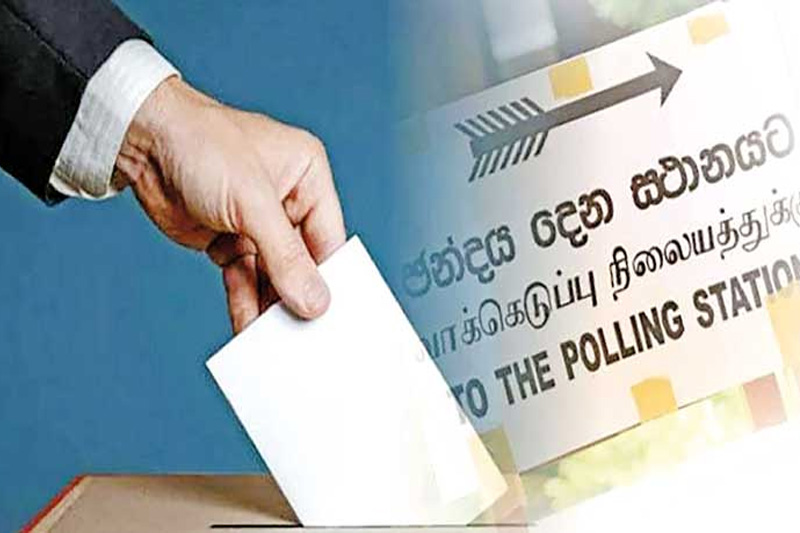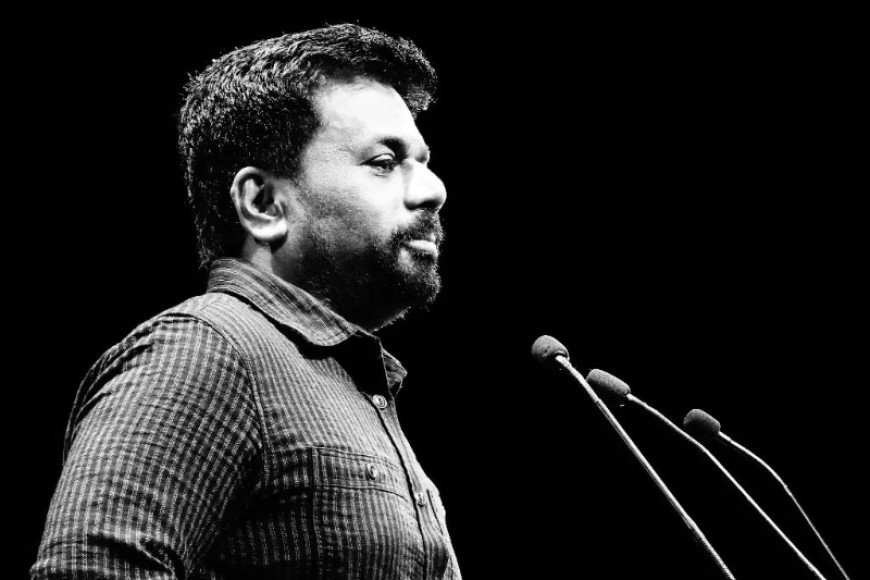President Anura Kumara Dissanayake (AKD) and his administration are now acutely aware of the pressing governance issues and the dire economic state of Sri Lanka.
This realization comes after a series of meetings with significant figures, including India’s External Affairs Minister Dr. S. Jaishankar, representatives from the International Monetary Fund (IMF), and diplomats from key nations.
These discussions underscored that Sri Lanka stands at a critical juncture economically, and the AKD government must navigate its recovery carefully to avoid regressing to the economic hardships faced in 2022.
The AKD administration is poised to prioritize foreign policy, given the increased international engagement necessary for Sri Lanka's recovery.
Geopolitical dynamics are also crucial, as there is a perception that a Leftist government may lean more towards China. Meanwhile, India remains vigilant, having played a vital role in supporting Sri Lanka's recovery through financial assistance and securing the IMF program and the debt restructuring initiative.
However, there have been reports of translation issues during the President's recent meetings with foreign diplomats.
Several envoys noted that their messages were not accurately conveyed to AKD, which could lead to misunderstandings in international relations. Moreover, the new government appears to be uncertain about establishing a clear foreign policy direction, overly relying on the Ministry of Foreign Affairs for ongoing engagements.
Despite these challenges, there was positive news last Friday (October 4): the completion of consultations regarding Sri Lanka’s debt restructuring with the IMF and the Official Creditor Committee (OCC) of the Paris Club.
The Sri Lankan government announced that it had successfully completed consultations with local and international holders of International Sovereign Bonds (ISBs), confirming compliance with the necessary terms and conditions.

The announcement emphasized that following the recent Presidential Election and the establishment of the new government, Sri Lankan authorities endorsed the debt restructuring targets and intended to expedite the implementation of ISB restructuring transactions.
Nevertheless, it appears the AKD government is contemplating revisiting the existing debt treatment agreement with ISB holders. While no final decision has been made, AKD's National People’s Power (NPP), led by the Janatha Vimukthi Peramuna (JVP), has expressed criticism towards the deal established by the previous government just days prior to the election.
Another pressing concern is the anticipated delay of the IMF’s third review of Sri Lanka’s performance until after the upcoming Parliamentary Elections on November 14.
This postponement may affect the disbursement of the next tranche under the Extended Fund Facility (EFF) arrangement, potentially pushing it to next year. Should the IMF review take place in late November, the findings may not be included in the Executive Board's agenda for December, delaying the report until January 2025.
In the meantime, AKD's economic team is set to travel to Washington, D.C., later this month to discuss proposed changes within the framework of the ongoing program with the IMF.
During meetings on October 3 and 4, an IMF delegation led by Asia Pacific Department Director Krishna Srinivasan engaged with President AKD to review the EFF program. AKD's economic team, which includes two members from the previous administration, Central Bank Governor Dr. Nandalal Weerasinghe and Finance Ministry Secretary Mahinda Siriwardana, is expected to lead negotiations with the IMF going forward.
Throughout these discussions, the new government underscored the necessity of incorporating welfare initiatives and alleviating the tax burden on citizens within the existing program framework. The IMF has indicated that while it recognizes these proposals, priority must still be given to state revenue targets.
The IMF has also issued warnings about significant vulnerabilities and uncertainties in Sri Lanka's economic landscape. Julie Kozack, Director of the IMF Communications Department, emphasized the importance of maintaining momentum in the ongoing reforms.
Dr. Jaishankar, the first high-ranking foreign dignitary to visit Sri Lanka since AKD took office, signifies India’s intent to strengthen ties with the new government. The Indian High Commissioner to Sri Lanka, Santosh Jha, was quick to congratulate AKD following his election. Jaishankar's visit included an invitation from Indian Prime Minister Narendra Modi for AKD to visit India.
Speculation has arisen regarding AKD's first international trip, with concerns that geopolitical factors might prompt him to choose a neutral destination over India. During his discussions with Jaishankar, the Indian Minister mentioned that payments for seven completed Line of Credit (LOC) projects totaling $20 million could potentially be converted into grants. Additionally, India is gifting Sri Lanka 22 diesel locomotives for its railway system.
During his interactions, AKD indicated that discussions about ongoing Indian projects would take place after the forthcoming Parliamentary Elections. He acknowledged renewable energy as a critical solution for many of the issues plaguing Sri Lanka's power sector.
As the country heads into election season once again, albeit more subdued than the previous campaign, historical political patterns suggest that the winner of the initial national election has a strong chance of securing victory in subsequent elections. Since 1977, this trend has been consistent among various leaders and parties.

The upcoming Parliamentary Election is particularly noteworthy, as it represents a significant moment in Sri Lankan history. It marks the first time that the JVP-led NPP has ascended to power following its presidential election victory. Notably, it also presents the potential for a Leftist political party to govern independently, without the need for a coalition.
Given the internal disarray within opposition parties like the Samagi Jana Balawegaya (SJB), the Sri Lanka Podujana Peramuna (SLPP), the Sri Lanka Freedom Party (SLFP), and the United National Party (UNP), the NPP stands a strong chance of securing a decisive victory in the Parliamentary Elections. Initial discussions to form a broad coalition among these opposition parties collapsed due to disagreements over leadership and candidate selections.
President AKD has promised to dissolve Parliament shortly and has set a date for the general election, which will serve as a crucial test of his administration. To implement the ambitious promises made during his presidential campaign, securing a two-thirds majority in Parliament is vital.
In the recent presidential election, the votes were distributed as follows: Ranil Wickremesinghe received 2,299,767 votes (17.3%), Sajith Premadasa garnered 4,363,035 votes (32.8%), and Namal Rajapaksa received 342,781 votes (2.6%). The Tamil common candidate received 226,343 votes (1.7%), while Dilith Jayaweera acquired 122,396 votes (0.7%).
The NPP must remain vigilant in strategizing for the upcoming elections, especially considering the combined vote totals of Wickremesinghe and Premadasa, which surpass AKD’s votes, potentially translating into more parliamentary seats for them. The NPP must carefully assess regional factors and candidate selections to optimize their electoral prospects.
Seventeen secretaries have been appointed to form a caretaker government, although there are ongoing discussions about certain appointments. Retaining the Secretary of Finance is crucial for continuity in the ongoing IMF program. However, any changes to leadership positions like the Central Bank Governor require parliamentary approval.
Should the NPP secure a parliamentary majority, President AKD may face significant challenges in appointing a Prime Minister of his choosing, as Article 43(4) of the Constitution mandates the appointment of a Prime Minister who can command the confidence of Parliament.
If the opposition gains control, it could lead to early challenges for President Anura, especially in securing parliamentary approval for his policy statement and funding necessary for its implementation. Under the Constitution, the President's powers could be significantly limited by a Prime Minister-led legislature, particularly if a partisan Speaker is appointed.
Ultimately, the NPP must stay alert to these dynamics, ensuring their candidate selections resonate with constituents. They should also launch a robust election campaign to build confidence among all demographic groups, particularly among the Tamil-speaking population in the North and East.
Seeking a two-thirds majority in Parliament is essential for fulfilling their proposed policies and maintaining their political foothold. If the NPP does not solidify its position, the opposition may regroup, posing a serious challenge to their ambitions.



